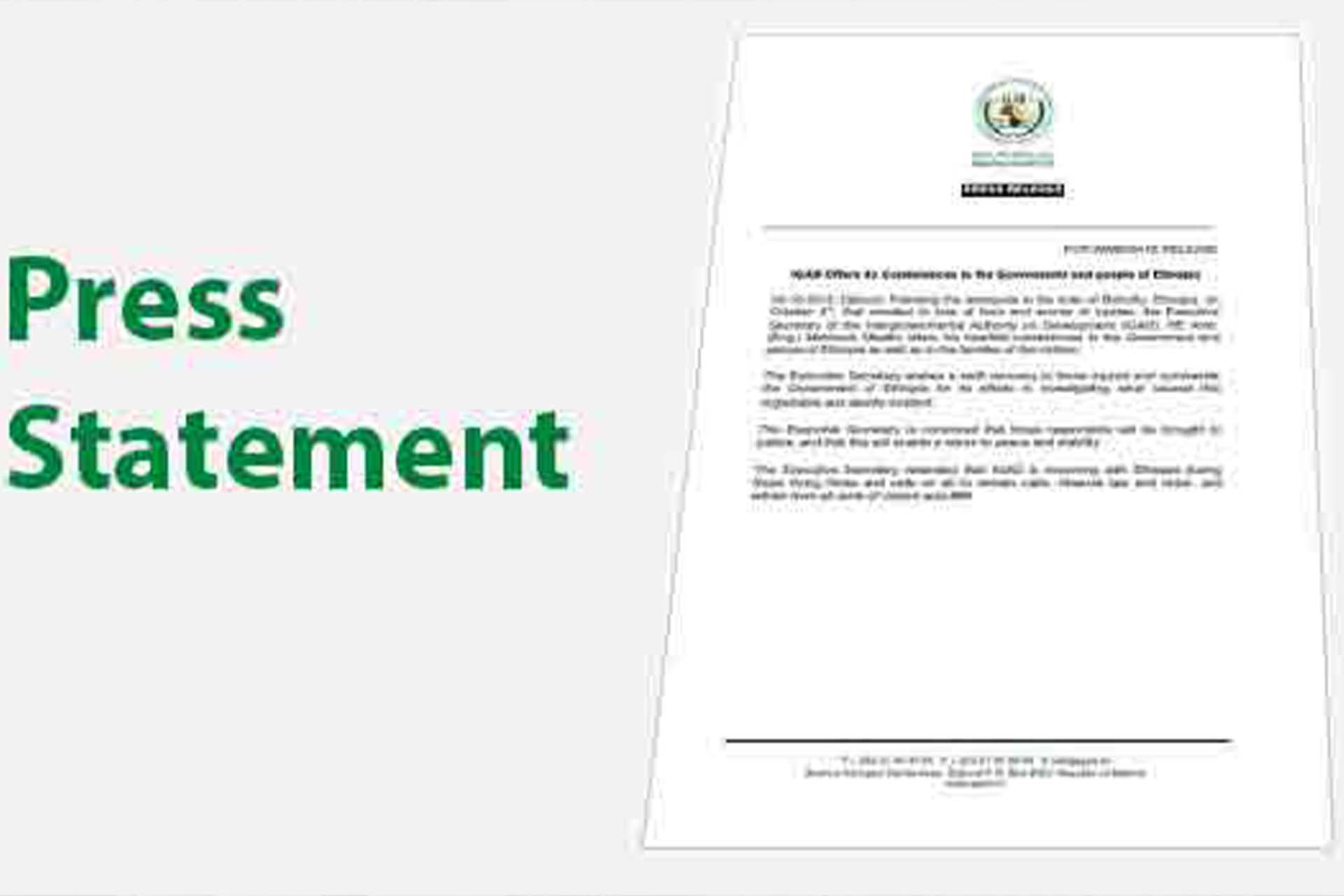
MINISTERIAL STATEMENT ON THE IMPACT OF COVID-19 ON PEOPLE ON THE MOVE IN THE IGAD REGION
2 SEPTEMBER 2020
____________________________________________________________________
We, the Ministers for Internal Security and Ministers in charge of Migration Issues of the Member States of the Inter-Governmental Authority on Development (IGAD) namely: Republic of Djibouti, Federal Democratic Republic of Ethiopia, Republic of Kenya, Federal Republic of Somalia, Republic of South Sudan, Republic of the Sudan and Republic of Uganda, held a virtual ministerial meeting on the Impact of COVID-19 on People on the Move in the IGAD Region on 2 September 2020 with representatives from international organizations working on migration and displacement namely; UNHCR, IOM, GIZ and other UN Agencies, as well as representatives of the EU, Sweden and Germany.
Recalling the decision of an Extraordinary Summit of the IGAD Heads of State and Government on coronavirus diseases (COVID-19) pandemic held virtually via a video-conference on 30 March 2020 and resolved to:
- Formulate an IGAD Regional Response Strategy to pandemic diseases particularly COVID-19;
- Establish an IGAD Emergency Fund for the control of pandemic diseases and the strengthening of health systems in the region;
- Mobilize support from the international community to combat COVID-19, strengthen national health systems and build local manufacturing capacity for medical equipment and supplies to fight pandemic diseases, and;
- Mobilize support from IGAD medical professionals in the diaspora.
After considering the report of the deliberations of the High Level Meeting of Experts and recommendations therein, we hereby solemnly declare to:
- Enhance cooperation and coordination with the countries of destination and transit, as well as relevant agencies and partners, to guarantee the immediate provision of humanitarian assistance, and facilitation of safe and urgent release, return and reintegration;
- Promote inclusive public health and socio-economic response and recovery strategies that integrate the protection of and assistance needs for people on the move;
- Promote equal and non-discriminatory treatment of all persons in line with international human rights principles and international law, irrespective of their immigration and citizenship status or the fact of their displacement;
- Enhance community-based approaches for addressing drivers and sustainable return, and contextualize the approaches to the specific areas.
Now hereby commit:
On regional coordination, to:
- Develop a common regional position and engage as a block with the Gulf Cooperation Countries to ensure protection of IGAD migrant workers;
- Develop a common regional refugee management framework to promote the protection and durable solutions for refugees and host communities;
- Develop pre-departure and post-arrival protocols that are agreeable to countries of origin and countries of destinations to enable safe returns;
- Establish interstate collaboration on diplomatic and consular assistance for migrant workers particularly in countries where some IGAD member states have no diplomatic representation;
- Support the strengthening and operationalization of National Coordination Mechanisms–government led inter-agency coordination platforms for discussing emerging migration issues and facilitating cooperation among relevant stakeholders with migration related functions to serve as the foundation for the whole-of-government approach to migration governance;
- Promote integrated border management – firstly as a direct response to COVID-19 for a better whole-of-government approach but also for a more long-term result noting the nexus to migration, trade, regional law enforcement and data exchange;
- Enhance inter-ministerial coordination and collaboration, including the involvement of other actors such as the private sector, social partners and civil societies;
- Promote the adoption and implementation of the protocols on Free Movement of Persons and on Transhumance to enhance safe, orderly and regular mobility;
- Cooperate on intelligence gathering and sharing to prevent smuggling and trafficking of migrants and combat transnational organised crime;
- Promote coordinated approaches in the developments of bilateral labour migration agreements (BLMAs) and harmonisation of labour laws, and;
- Develop joint programmes and intervention to address the needs of people on the move.
On health and socio-economic inclusion, to:
- Strengthen national health systems to cater for the needs of people on the move;
- Enhance existing national-level disease surveillance systems by linking mobility information to surveillance data;
- Promote cross-border and integrated border management and health-surveillance;
- Integrate migrant workers, refugees and IDPs in the socio-economic recovery packages;
- Provide mentoring and business development solutions through diaspora and financial institutions engagement;
- Engage with state and non-state financial regulators to create facilitation schemes for reducing remittances costs and provide financial literacy to urban and rural communities;
- Support Public Private Partnerships and establish synergies with the private sector including by involving multilateral development banks such as the World Bank and the African Development Bank (AFDB) and other international actors’ programs;
- Engage more actively and mobilize diaspora support (financial, investment, philanthropy, return of qualified nationals, e-platforms for engagement in education, business mentoring, Training of Trainers, etc.), and;
- Improve integration and reintegration assistance for migrant workers at local and national level, addressing the needs of the most vulnerable, youth and women.
On protection, to:
- Promote safe implementation of border control measures in full respect of international human rights, international humanitarian and international refugee law, as well as labour standards;
- Advocate for alternatives to detention and end child detention and consider temporary suspension of detention in the context of COVID-19;
- Promote coordinated and voluntary returns and consider temporary suspension of forced returns in the context of COVID-19;
- Promote continuity of services and care along migration routes including through the Migration Response Centres, and;
- Promote awareness raising and information campaign including information related to symptoms, prevention, control of spread, treatment, and social relief for people on the move.
On drivers of involuntary migration, to:
- Promote resilience of communities to address the drivers of irregular migration and forced displacement;
- Map areas affected by high outward migration and return to support national and sub-national development planning, and;
- Mobilize resources for local development planning including through the support of Public Private Partnerships and establishing synergies with the private sector.
We further decide to remain actively seized of this matter.
Done virtually on 2 September 2020

